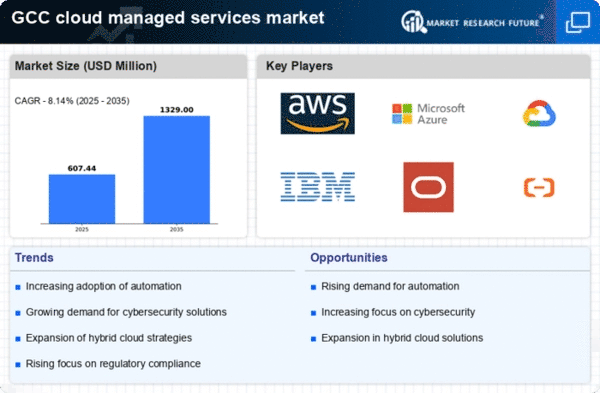Expansion of Internet Connectivity
The expansion of internet connectivity across the GCC is a pivotal driver for the cloud managed services market. Enhanced internet infrastructure facilitates the adoption of cloud services, enabling businesses to access managed services more efficiently. With the rise of high-speed internet and mobile connectivity, organizations are increasingly able to leverage cloud solutions for their operations. This trend is expected to contribute to a projected growth rate of 20% in the cloud managed-services market over the next few years. As connectivity improves, businesses are likely to embrace cloud technologies, further driving the demand for managed services in the region.
Growing Focus on Cost Optimization
Cost optimization remains a critical driver in the cloud managed-services market, particularly within the GCC region. Organizations are increasingly recognizing the financial benefits of transitioning to cloud-based services. By leveraging managed services, companies can reduce their capital expenditures on hardware and software, shifting to a more predictable operational expenditure model. Recent studies indicate that businesses can save up to 30% on IT costs by utilizing cloud managed services. This focus on cost optimization is compelling many organizations to adopt cloud solutions, thereby propelling growth in the cloud managed-services market as they seek to enhance their financial performance.
Shift Towards Remote Work Solutions
The shift towards remote work solutions is reshaping the cloud managed services market in the GCC. Organizations are increasingly adopting cloud-based tools to support remote work, enhancing collaboration and productivity among distributed teams. This transition has led to a surge in demand for managed services that can provide secure and efficient remote access to applications and data. As businesses recognize the benefits of flexible work arrangements, the cloud managed-services market is expected to grow significantly. The ongoing trend towards remote work is likely to continue influencing the market, as companies seek to implement effective solutions that facilitate remote operations.
Rising Demand for Scalable Solutions
The cloud managed-services market is experiencing a notable increase in demand for scalable solutions. This demand is particularly evident among businesses in the GCC. Organizations are seeking flexibility to adjust their IT resources based on fluctuating needs. This trend is driven by the necessity for cost efficiency and operational agility. According to recent data, the market is projected to grow at a CAGR of 15% over the next five years. Companies are increasingly adopting cloud services to enhance their scalability, allowing them to respond swiftly to market changes. This rising demand for scalable solutions is a key driver in the cloud managed-services market, as businesses aim to optimize their IT infrastructure while minimizing costs.
Increased Regulatory Compliance Requirements
The cloud managed-services market is significantly influenced by increasing regulatory compliance requirements. These requirements are particularly relevant in the GCC. As governments and regulatory bodies impose stricter data protection laws, organizations are compelled to ensure compliance with these regulations. This has led to a surge in demand for managed services that can provide robust security and compliance solutions. Companies are seeking partners who can help them navigate the complexities of compliance, which is driving growth in the cloud managed-services market. The need for adherence to regulations is likely to continue shaping the market landscape, as businesses prioritize compliance to avoid penalties and reputational damage.
















